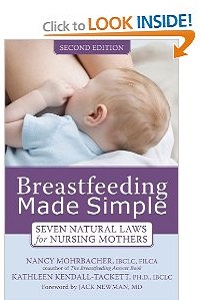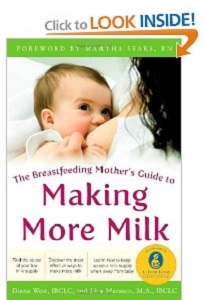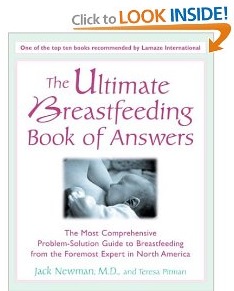
|
|||||
|---|---|---|---|---|---|

|
|||||
Popular Articles: |
JUMP TO: Reasons 1-12 - Reasons 13-27
 Breastfeeding Made Simple: Seven Natural Laws for Nursing Mothers - Click for more info: US | CA | UK |
The high lactose content of human milk enhances the absorption or retention of several minerals. Lactose is vital for preserving the acid PH in your baby's gut, which favours the helpful bacteria needed to manufacture vitamins. Lactose is a crucial nutrient for brain growth. Artificial formulas use corn syrup solids, sucrose and other carbohydrates to replace this lactose.
There has been great concern about the level of nitrosamines (chemicals known to cause cancer) in bottle nipples. In March 1984, the FDA began urging parents to boil bottle nipples several times before using them, changing the water each time, to lower nitrosamine levels. This may seem a trivial risk, yet those investigating stomach cancer must ask themselves about this very early exposure to the carcinogen known to cause stomach cancer.
medicine.
If you and your baby are exposed to some infection, your breast-fed baby doesn't have to fight the infection alone. Although your baby's immune system is as yet under-developed, your milk makes and provides a dose of the specific antibody needed, as well as the non-specific antibodies factors.
The secretory IGA coats your baby's intestines, to help prevent the entry of foreign substances through the stomach wall, that might lead to allergic reactions. Some is also absorbed to provide systematic protection. Colostrum is concentrated milk, especially designed to help baby's kidneys and all other systems adjust to their tasks.
 The Breastfeeding Mother's Guide to Making More Milk - Click for more info: US | CA | UK |
Weaning begins the moment something other than human milk is added to your baby's diet. Whether bottles of artificial milk or solids, as your child nurses less the level of human milk consumed drops. Yet the level of antibodies rises. This is to help protect both your breasts and your weaning child from infection.
This effect has been seen to be almost as dramatic in modern, middle-class community as in developing countries. In fact, human milk has been used as therapy in cases of chronic intractable diarrhoeal disease in older children, and is protective even against cholera.
Prolonged exclusive breast-feeding will significantly reduce the incidence of food allergy and intolerance, even in families with a strong tendency to allergy. However, intrauterine sensitization is possible. Further, allergic foods can be transmitted through your breast milk. Changing your (the mother's) diet may bring instant relief.
When news reports come out about chemicals and pesticides found in human milk, there is never any mention of all the chemical pollution of formula. The pasture, the feed, the milk, the tanker that transports it, the water used in manufacture and preparation, the cans that store it . . . are even more at risk of being contaminated.
All babies begin to accumulate radio-active strontium in their bones before birth. For the breast-fed baby, the body content of stontium lowers as your baby excretes more than is taken in. However, the artificially-fed baby has increased strontium in his bones, as cow's milk can contain 6 times as much strontium as human milk. The mineral content balance of cow's milk ensures it is deposited on your baby's bones.
 The Ultimate Breastfeeding Book of Answers Click for more info: US | CA | UK |
Four New Zealand scientists say a baby drinking soya milk would consume 100 times the amount of natural estrogen that a breast-feed baby receives, equivalent to several contraceptive pills a day.
Milk does not pool in your baby's mouth (against the teeth) when suckling at your breast. The milk is ejected at the back of your baby's mouth and throat, spilling over the epiglottis (which covers the larynx), stimulating an immediate swallow reflex. When your baby falls asleep and stops suckling, the milk flow stops.
Stimulated by lactation hormones, your uterus quickly reverts to normal. Delays have occasionally led to blood clots. The risk of blood clots (or embolisms) is greatly increased if a non-breast-feeding mother uses Stilboestrol, a drug used to suppress lactation.
Lactation uses the fat deposited during your pregnancy for just this purpose - as long as you don't over-eat. Breast-feeding and gradual weaning results in fat being redeposited in your breasts. If this happens, then your breasts will resemble their pre-pregnancy size, if not shape.
This can be of vital importance, to allow your body to build up your iron store, reducing your chances of developing anemia. As long as you're not having a period, you most likely won't get pregnant again. (A small amount of women can get pregnant before their first period.) Both the frequency and length of sucking can affect the return of ovulation and your periods.
Particularly if a woman has had difficulties and overcomes them, she becomes aware of how much this difficulty corroded her sense of pride and confidence in her body as a basic biological being. There is something so rewarding about sustaining and making your child happy with your own milk.
JUMP TO: Reasons 1-12 - Reasons 13-27
Breastfeeding: New Discoveries, by Dr. Wootan.
This article compliments of Born to Love.
Send questions, comments, and suggestions to: catherine@borntolove.com
Born to Love articles are written by Catherine McDiarmid-Watt
Born to Love is a participant in the Amazon Services LLC Associates Program, an affiliate advertising program designed to provide a means for sites to earn advertising fees.
NOTE: All logos, company names, brands, images, trademarks and other intellectual property are the property of their respective owners.
Born to Love is a participant in the eBay Partner Network, an affiliate advertising program designed to provide a means for sites to earn advertising fees by advertising and linking to eBay.com.
Copyright © 1978 - BorntoLove.com - All Rights Reserved.
Last updated - April 5, 2024